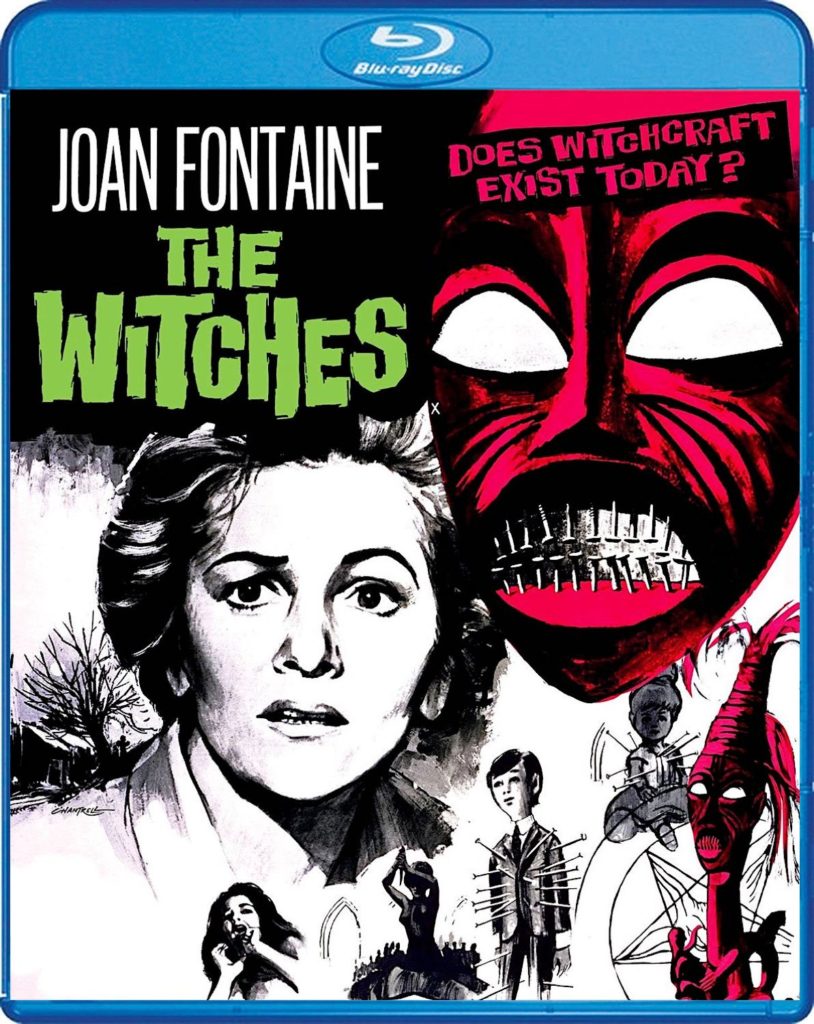
One of Hammer’s strongest ’60s shockers comes to Blu-ray from Scream Factory
Director Cyril Frankel’s 1966 supernatural drama THE WITCHES (based on the novel “The Devil’s Own” by Peter Curtis) might be one of Hammer’s most misunderstood and undervalued productions, with casual admirers of the venerable studio’s output often either ignoring or dismissing it. This is likely due to the film being released squarely in the center of Hammer’s “Golden Age”, when the company had had a near decade-long paydirt mining and perfecting Gothic melodrama and more sensational shockers. It defied audience expectations and needs, in some respects. But Frankel’s eerie mystery is more in-line with the studio’s post-PSYCHO “Mini-Hitchcock” thrillers, material like Frankel’s own queasy NEVER TAKE SWEETS FROM STRANGERS, but one armed with a supernatural twist and buoyed by two mature female leads in the cast. But unlike Hammer’s 1965 scenery-chomper DIE, DIE MY DARLING – in which an aged and deranged Talulah Bankhead out-babied BABY JANE – THE WITCHES is no pandering horror-hagsploitation potboiler. It’s something far more evolved and interesting (and I say that with ardent adoration of the hagsploitation subgenre).
THE WITCHES stars Hollywood legend Joan Fontaine (Hitchcock’s REBECCA) as hard-nosed school teacher Gwen Mayfield who, after enduring a nightmarish experience in Africa (a berserk pre-credits sequence featuring monstrous witch doctors and tiki-men bursting into her classroom while Fontaine collapses, screaming), has endured a right and proper nervous breakdown. Once back on her feet, she accepts a job teaching the children of a tiny rural English Hamlet, an ideal position in a seemingly idyllic and peaceful community. However, almost from the moment she arrives, Gwen suspects something is “off”. The local minister turns out not to be a minister at all, despite wearing the collar for “comfort”; odd pagan talismans appear in tree trunks; some of the population seem to be in a kind of somnambulist state; and the town seems to be trying very hard to sabotage the budding romance between a pair of perfectly sweet and healthy teenagers. When people begin to die and Gwen starts to believe the whispers of witchcraft drifting through the village, she aims to do something about it, an act she might live to regret.
Frankel creates a sense of doom and paranoia in THE WITCHES while letting the story build slowly, giving plenty of space to develop each key character and also keeping a harness on the central mystery of the movie. Our point of entry into the picture is with Fontaine and remains so, therefore we march sympatico with her, reacting to the ratcheting terror and phenomena she experiences. In this regard, the film has the same mood that would be later be sexualized and darkened in 1973’s THE WICKER MAN, with a stranger in a strange land trying to decipher a conspiracy, while also being a pawn in a larger scheme. Fontaine sells Gwen thoroughly and she’s matched by Kay Walsh, whose optically friendly and kindly facade masks a kind of casual, grinning, narcissistic evil. It’s not a spoiler to cite Walsh as the matriarch of the village’s demonic hold, as many lobby cards and studio stills depict her in full witch regalia. But it’s the “hows” and “whys” of her mission that truly unsettle and chill the blood.
On that note, some have criticized the ending of THE WITCHES as being histrionic and at odds with the measured pace of the preceding picture, but that’s exactly why it’s so great. The frenzied, mildly erotic and perverse climax is kind of a Satanic orgy interpreted as modern dance. It’s an insane and wild, wide-eyed send-off for what is truly one of Hammer’s crowning achievements. And Scream Factory is to be commended for both their beautiful high-def transfer and the spattering of extras, including an academic commentary by Hammer historians Constantine Nasr and Ted Newsom as well as a fine documentary on the ladies of Hammer, ported over from a previous release. Recommended!
